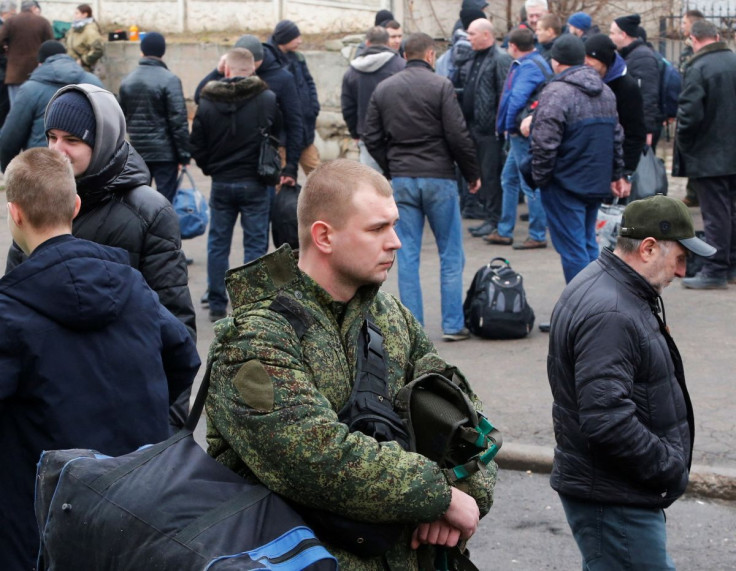Raw Recruits Called Up To Fight In Russian-backed Separatist Region

Andrey, 21, had never held a gun before this week. It came as a shock when he received a phone call telling him he had been called up for military duty.
Two days later, he was sitting on a bus on his way to join an artillery unit of the Donetsk People's Republic, one of two breakaway territories in eastern Ukraine that Russian President Vladimir Putin formally recognised on Monday and brought under Moscow's protection.
Putin's move, denounced as illegal by most of the world and met with a wave of sanctions against Moscow, marks a new phase in the crisis that pits Ukraine's pro-Western government against the two separatist regions and the threat of a Russian invasion.
Preparing for the possibility of all-out war, the separatists are calling up men aged 18-55 to take up arms, and even some older men are joining up. Andrey, who enlisted with a student friend, said they had no choice in the matter.
"Let's just say that having assessed the situation and the possible risks of prosecution, we decided to volunteer. I don't want to fight, though. And they didn't send us to the goddamn rear units, they sent us straight into hell."
At a mobilisation point in a sports hall in the city of Donetsk, Reuters interviewed recruits of widely differing ages and experience, all of whom declined to be identified with their full names.
Some had received call-up letters or phone calls, while others said they had come forward of their own accord. For days, Donetsk residents have been receiving text messages telling men it is their "sacred duty" to defend their fatherland, while loudspeakers blare out similar messages in the streets.
"I think there will be a war. We'll see. We're always ready," said Artur, 28, a reserve lieutenant with five years of army experience.
Dmitry, a man of about 30, said he had volunteered by himself. "The family doesn't know yet. They'll find out tonight," he said.
Sergei, 54, a mine worker with knowledge of explosives, said the rest of his family had left for safety in Russia but he had stayed behind. "I came to defend my homeland," he said.
A middle-aged father said his 20-year-old student son had received the summons the day before. "He said, 'What am I going to do, hide? I'll go like everyone else.'"
Some men, however, were fearful of going into battle.
Alexander Golovan, 40, said he was trying to secure an exemption for his brother, a diabetic who requires insulin injections five times a day but had received a written summons.
A 38-year-old husband and father of three, who said he was too scared to give his name, said he was avoiding leaving the house because he had heard of people being stopped in the street by the military.
MILITARY SECRET
Asked about the incidents, separatist spokesman Eduard Basurin said recruits underwent checks by a medical commission.
"Why would you take a seriously ill person - to send him straight for slaughter?" he said.
Basurin confirmed that street patrols were stopping and checking people to see if they had been called up, but he said no use of force was involved.
He declined to give details about the extent of the call-up.
"We do not comment on the number of mobilised people and plans; that is a military secret."
Denis Pushilin, leader of the separatist region, told reporters that it was compulsory for men to accept the summons.
"Yes, that is a requirement under our law. Dodging the draft means a criminal prosecution. There is nothing surprising there," he said.
Companies were obliged to make only 50% of their manpower available to the military in order to keep the economy going, and people in critical roles, such as chief engineers, would not be sent to fight.
One of the men interviewed by Reuters was overcome with anger and morbid thoughts as he contemplated his fate, cursing Putin and Ukrainian President Volodymyr Zelenskiy.
"It will be funny if I'm talking to you for the last time," he said. "It's been decided for me that I'm going to die, not live."
The next day, he sent a Reuters reporter a photo of himself, holding a gun.
(Writing by Mark Trevelyan; Editing by Cynthia Osterman)
© Copyright Thomson Reuters {{Year}}. All rights reserved.





















